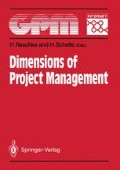Abstract
The profound changes in our world during these decades cause difficulties and failures when using the conventional management and project management logic. A new management style has therefore grown up, cut up to the modern turbulent world with its demanding people and many interested parties. The group of new style managers, including project managers, however, has largely no management aids or planning systems, which are cut up to their new logic. Among the very few reported systems in this group, the Successive Principle is probably the most general and widespread. It is taken here as an example for the large potentials of improvements when a manager, his situation and his tools all fit together. This chapter presents an overview of these changes into a new logic and the practical experiences of 15 years applications of this new management logic and related planning systems.
Access this chapter
Tax calculation will be finalised at checkout
Purchases are for personal use only
Preview
Unable to display preview. Download preview PDF.
References
Lichtenberg, S.: Successiv Kalkulation (Successive Estimating), Denmark 1970/71.
Lichtenberg, S.: Project Planning a Third Generation Approach, Lyngby (Denmark) 1974. See also: Lichtenberg, S.: Project Management Systems Monsters or Assistants to the Manager In Proceedings of an International Symposium, Project Management Institute, Wash. DC. 1976, pp. 152–158.
Lichtenberg, S.: The Successive Principle, Proceedings, Project Management Institute, Wash. DC. 1974, pp. 570–578.
Lichtenberg, S.: Projektplanlmgning i en foranderlig verden (Project Planning in a Changeable World), Lyngby (Denmark), 3rd ed. 1990
Lichtenberg, S.: Real World Uncertainty in Project Budgets & Schedules. In: Proceedings PMI/INTERNET Joint Symposium, Boston, Sept. 81, pp. 179–193.
Ögïird, Leif: Experiences from new Planning Methods, Risk Estimation and Team Building Concept in the Sydgas Project, the first Natural Gas Project in Sweden. In: Proceedings of the 7th INTERNET Congress, Copenhagen Sept. 82.
Lange, Nils: Subjektiv Vurdering ( Subjective Evaluation) M.Sc. Thesis 1986.
Glahn, J.E., Lichtenberg, S.: The Successive Principle: A Quality Assurance Technique for Schedules and Budgets, Waterloo (Canada ) July 1984.
Editor information
Editors and Affiliations
Rights and permissions
Copyright information
© 1990 Springer-Verlag Berlin, Heidelberg
About this chapter
Cite this chapter
Lichtenberg, S. (1990). Experiences from a New Logic in Project Management. In: Reschke, H., Schelle, H. (eds) Dimensions of Project Management. Springer, Berlin, Heidelberg. https://doi.org/10.1007/978-3-642-49344-7_13
Download citation
DOI: https://doi.org/10.1007/978-3-642-49344-7_13
Publisher Name: Springer, Berlin, Heidelberg
Print ISBN: 978-3-540-53157-9
Online ISBN: 978-3-642-49344-7
eBook Packages: Springer Book Archive

